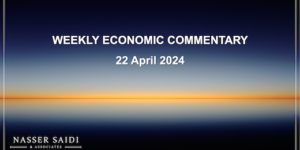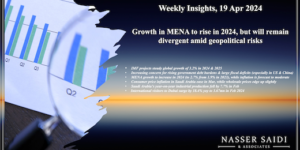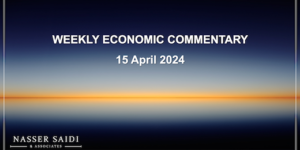Markets
Stock markets started the week under severe downward pressure as in tech sectors. The pressure intensified after JP Morgan results spurred worries that quarterly earnings will disappoint. Both the Nasdaq and the S&P500 recorded the deepest weekly dive since June 2012, with the biotech sector losing more than 20% since end-Feb. Contagion from Wall Street extended to Asian equities with Topix down almost 7%, but regional and other emerging markets appeared insulated. Abu Dhabi’s gauge touched an 8-year high amid speculation of inclusion in the MSCI emerging market index. The dollar benefitted from a flight to safety in the Treasuries but then lost ground to the euro while the yen had the best week in a month. Gold posted gains on worries over softer monetary policy and oil remained well bid.
Global Developments
US/Americas:
- US wholesale inventories increased 0.5% mom in Feb following a rise of 0.8% mom in Jan. Wholesale inventories less autos, a component of GDP, rose 0.5% mom, signaling a weaker Q1.
- The Thomson Reuters/University of Michigan consumer sentiment index improved to a more-than-expected 82.6 in Apr from 80 in Mar.
- Initial jobless claims in the US dropped to 316,250, the lowest since September. The four-week moving average fell by 32,000 to 320,000.
Europe:
- After four years under a stabilization program Greece successfully returned to the markets selling EUR 3bn in 5-year government bonds with a 4.95% yield. The issue was oversubscribed to the tune of EUR 20 bn. Almost 90% of the issue went to long-term foreign investors.
- Corporate rating upgrades exceeded downgrades in Europe in Q1 for the first time since 2008, according to Moody’s.
- German industrial production grew by a more-than-expected 0.4% mom sa in Feb after rising 0.7% in Jan. Output in Spain also pointed to unexpected strength, rising 2.8% yoy sa after a 1.3% yoy gain in Jan. But in France output rebounded by a less-than expected 0.1% mom from -0.3% mom in Jan. Italy too disappointed with production tumbling -0.5% mom (+0.4% yoy) from 1.1% mom in Jan (1.2% yoy).
- UK manufacturing output grew 0.9% mom (2.7% yoy) in Feb vs flat (2.8% yoy) in Jan, well above expectations.
Asia and Pacific:
- Chinese exports fell -6.6% yoy in Mar (against -18.1% in Feb). Imports declined a similarly worrying -11.3%. This is the second consecutive month of exports plunge, a worrisome sign of overall weakness.
- Bank of Japan President Kuroda said the economy could withstand a fall in spending following the VAT hike, the first in 17 years.
- Japan core machinery orders fell by a significantly more-than-expected -8.8% mom in Feb following a 13.4 gain in Jan.
- India’s industrial production was again disappointing in Feb falling -1.9% yoy while the trade deficit widened to a five-month high of USD 10.5bn in Mar, with exports contracting for the second-consecutive month.
Bottom line: At the G20 meeting officials expressed relief that the global economy is doing well while bickering on the repercussions of developed countries’ monetary policy on emerging markets. But the rosy gloss is losing its shine. The overvaluation of shares in many sectors is coming under closer scrutiny and the earnings season could prove rather disappointing. The International Monetary Fund warned China over the risk of hard landing due to poor asset quality and half-baked financial reforms. Indeed the data continue to underscore a difficult transition and a sort of Pavlovian reflex: every time GDP growth in China slows toward 7%, the authorities panic and engineer another round of credit-fueled capital investments adding to the stock of bad assets, non-performing loans, unnecessary real estate, costly infrastructure and industrial capacity. The result is more unsustainable public and private debt, which at some point must be curtailed.
Regional Developments
- Kuwait seems optimistic towards “positive steps” being taken as soon as this week to resolve the diplomatic standoff between Qatar and Saudi Arabia, UAE and Bahrain; it is anticipated that part of the deal would include a decision to send back the previously recalled ambassadors.
- GDP growth in Bahrain edged down to 5.4% yoy (and 0.7% qoq) in Q4, from Q3’s revised 5.7% yoy; the mining sector registered an expansion of 14.6% yoy while construction and financial services grew 1.5%.
- Egypt is projected to grow at 2.7% this year following a 2.1% rise last year, according to the IMF; the sluggish growth is a result of political uncertainty, which is likely to keep tourists and foreign investors away.
- Urban annual inflation in Egypt held steady at 9.8% in Mar, unchanged from the previous month as M2 money supply rose 17.02% in the year to the end of Feb.
- More reforms to be announced in Egypt? The country’s Planning Minister stated that major steps towards subsidy reform will be announced ahead of next month’s presidential election; the Housing Minister revealed that new legislative amendments are expected to be finalized within 2 months to support the real estate sector;
- Egypt’s government has set aside “around EGP 10bn” to buy wheat from local farmers, stated the Supplies Minister last week, to encourage domestic output and reduce its import bill; this is significantly higher than the EGP 7bn proposed by the Agriculture Minister last month.
- With Iraq buying close to 60 tons of gold during the past two months to enhance its reserves and stabilise the Iraqi dinar, the Central Bank of Iraq announced the increase in its gold reserves to reach about 90 tons, reported Aswat Al Iraq.
- Iraq is expected to boost its oil production to the international markets up to 300mn oil barrels in 2014, according to its Minister of Oil.
- Expatriate remittances in Jordan grew by 4.1% yoy to USD 550.1mn until the end of March, reported its Central Bank.
- Jordan‘s female economic participation rate stands at 22%, about a quarter of participation rates for men (at 87%), according to a World Bank publication “Economic Participation, Agency and Access to Justice in Jordan”.
- The IMF is expected to approve the disbursement of USD 264mn to Jordan late this month under a Stand-By Arrangement; the country has so far received around USD 1.043bn under the agreement to support the Kingdom’s economic reform programme.
- The Kuwait Fund for Arab Economic Development has signed an agreement with Yemen granting the latter KWD 300k to “build administrative and technical capacities of its personnel in such areas as development of financial policies, economic reforms and good governance programmes”.
- Kuwait increased its oil output capacity to 3.3mn barrels per day (bpd) and is expected to reach 3.5mn bpd by 2015, according to the head of its state oil company. It was also revealed that the Kuwait Petroleum Corporation will provide 85k bpd of oil to Egypt, up from 65k bpd previously.
- Banks in Lebanon went on a one-day strike last week to protest a proposal by lawmakers to tax interest earned on deposits more heavily (to 7% from 5% currently) to help fund public wages rises.
- Inflation in Oman fell to 0.6% in Feb, down from Jan’s 1.2%, and well-within the projected 4% rate this year. The highest yoy price rise was in education (+6.24%) while health costs increased by 3.5%.
- Total non-oil exports in Oman increased nearly 6% yoy to OMR 3.8bn in 2013, with non-oil exports to the UAE rising by 19.6% to OMR 658mn while non-oil exports to Saudi Arabia surged 64.5% to OMR 542mn. Non-oil exports to Pakistan was up 30% to OMR 282mn though exports to India and China decreased by 32% and 21.5% to OMR 416mn and OMR 217mn respectively.
- Oman’s net exports to India crossed over USD 2.57bn during Apr-Dec 2013 and has already crossed total exports of USD 2bn registered during Apr 2012-Mar 2013. Top exports from India include textiles and garments, machinery and equipment, electrical and electronic items, chemicals, iron and steel products alongside food products.
- Qatar’s Minister of Economy and Commerce stated that the country’s GDP grew by 6.5% to QAR 737bn in 2013. Meanwhile, Fitch expects a pick-up in non-hydrocarbon growth in Qatar, thanks to high government capital spending and population growth.
- The Council of Saudi Chambers, citing data published in 2012, stated that family owned-businesses in Saudi Arabia contribute almost 12.8% to GDP, representing more than SAR 350bn in volume of investments in the domestic market.
- Exports from Dubai to Saudi Arabia crossed AED 9bn in Mar 2014, according to data released by the Dubai Chamber of Commerce.
- The Middle East banking industry returned to double-digit revenue growth in 2013 with a 10.7% increase, thanks largely to international acquisitions, reports a BCG study. The 2013 BCG index includes 35 GCC banks, capturing nearly 80% of the total regional banking sector.
UAE Focus
- A top Dubai policymaker revealed that an agreement to merge the two main UAE stock exchanges had been reached in principle but not finalised yet. However, later in the week, the Chairman of DFM released a statement that DFM “is not involved in any of the discussions that had been taking place by the representatives of the governments of Dubai and Abu Dhabi nor is it party to any negotiations”.
- Emirates NBD may write back its NPL provisions against its Dubai World exposure this year, according to a senior bank representative; the bank had provisioned 5% of its total AED 9bn exposure to Dubai World and if reclassified as performing, will lead to a boost to the bank’s reported profits.
- The UAE Investment Law, to be released by end of this year, will not only enhance the overall investment and business environment in the country, but also boost the GDP between 3-4%, it was revealed by the UAE Minister of Economy, on the sidelines of a conference.
- UAE FDI inflows increased by 20% yoy to USD 11.5bn in 2013 (2012: USD 9.6bn) and value of the UAE investments abroad clocked USD 2.5bn in 2013, while total value of FDI touched nearly AED 2 trillion in the past 10 years, as per Undersecretary of the Ministry of Economy.
- Shortly after Emirates REIT’s successful IPO comes news that Marka will launch its IPO across UAE today (Apr 13); Marka, which is selling 275mn shares, 55% of the company’s capital, is open for subscription for 12 days, priced at AED 1 per share with a premium of 3 fils a share.
- UAE plans to raise oil production capacity to 3.5mn bpd by 2017, to meet growing demand, according to the country’s Energy Minister.
- Property deals in Dubai rise in Q1: the Land Department data show that the number of transactions were up 11% yoy to 15,694 in Q1, and value of deals surged by 38% to exceed AED 61bn. Further breakdowns show 11,567 sales activities worth a total of AED 31.5bn, about 3,482 mortgage transactions worth over AED 28bn and other categories valued at AED 1.7bn from 636 transactions.
- Gold trade through Dubai reached USD 75bn in 2013, and represents 40% of the world’s physical gold trade, according to the Executive Chairman of DMCC. It was also stated that DMCC is planning to list a spot gold contract on the Dubai Gold and Commodities Exchange (DGCX) by next month, after a similar contract on Nasdaq Dubai was dismantled.
Media Review
International Monetary Fund (IMF) released a study on Arab economic & political transitions
http://www.imf.org/external/pubs/ft/dp/2014/1401mcd.pdf
Tech and Unemployment in the Middle East
http://blogs.worldbank.org/arabvoices/new-technology-changes-the-working-day-mena
KKR invests in tech
http://www.ft.com/cms/s/0/e4e708da-b993-11e3-b74f-00144feabdc0.html
Saudi Royal Court embraces Twitter
http://blogs.wsj.com/middleeast/2014/04/07/saudi-royal-court-chief-breaks-silence-on-twitter/
A weaker Renminbi poses a big threat
http://www.ft.com/cms/s/0/5a02f9de-b9a9-11e3-b74f-00144feabdc0.html?siteedition=uk#axzz2yBbxy4dQ
Unhappy birthday of qualitative and quantitative easing in Japan
http://blogs.ft.com/money-supply/2014/04/07/kurodanomics-one-year-on/
Bickering at the G20
All you want to know on the history of GDP






